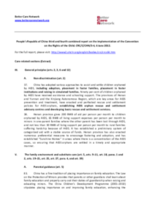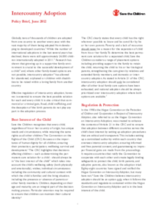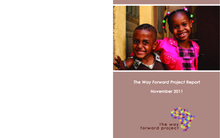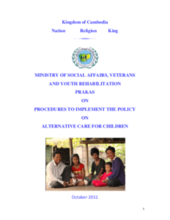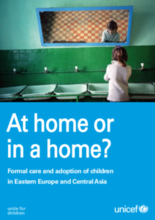Displaying 541 - 550 of 623
In the third edition of EveryChild’s working paper series, Positive Choices, the practices of domestic and inter-country adoption are examined. The paper aims to explore why adoption is so rarely used globally, and to examine whether or not an expansion of adoption services could offer a potential solution to the millions of children around the world in need of permanent care and currently languishing in harmful institutions.
The People’s Republic of China issued its third and fourth combined report on the implementation of the Convention on the Rights of the Child in June 2012. This extract of the report focuses on sections relevant to children's care and in particular those addressing Family Environment and Alternative Care
This policy brief by Save the Children sets out the organization’s position on intercountry adoption, highlighting research findings and referring to international legal standards and good practices. Recognizing that intercountry adoption has played a role in allowing for abandoned, orphaned or children with disabilities to be raised in a loving family from another country, the organization stresses effective regulation to ensure it serves the best interest of the child and does not involve commercial or criminal gain, fraud, child trafficking, or the deception of the birth parents.
Utilizing the United Nations Convention on the Rights of the Child and the Guidelines for the Alternative Care of Children, this paper from Monographs of the Society for Research in Child Development Volume 76, Issue 4 examines critical components and current characteristics of alternative care for children in low‐resource countries.
This monograph reviews literature pertaining to children without permanent parents.
This chapter from Monographs of the Society for Research in Child Development Volume 76, Issue 4 first presents a review of research on the development of adopted children, focusing on meta‐analytic evidence and highlighting comparisons between adopted children with and without histories of early adversity.
The Congressional Coalition on Adoption Institute’s The Way Forward Project brought together a group of international experts to discuss opportunities and challenges facing governmental and non-governmental organization leaders in six African nations (Ethiopia, Ghana, Kenya, Malawi, Rwanda, and Uganda) as they work to develop systems of care that serve children in and through their families.
This Prakas is intended to define roles and responsibilities of relevant competent agencies and establish procedures, operational guides, and forms to implement the Policy on Alternative Care for Children.
In this position paper, the Muslim Women’s Shura Council considers whether adoption can be possible within an Islamic framework.
Published by UNICEF, the report At Home or in a Home, provides an overview of the major trends and concerns about children in formal care and institutions as well as adoption Central and Eastern Europe and Central Asia.


